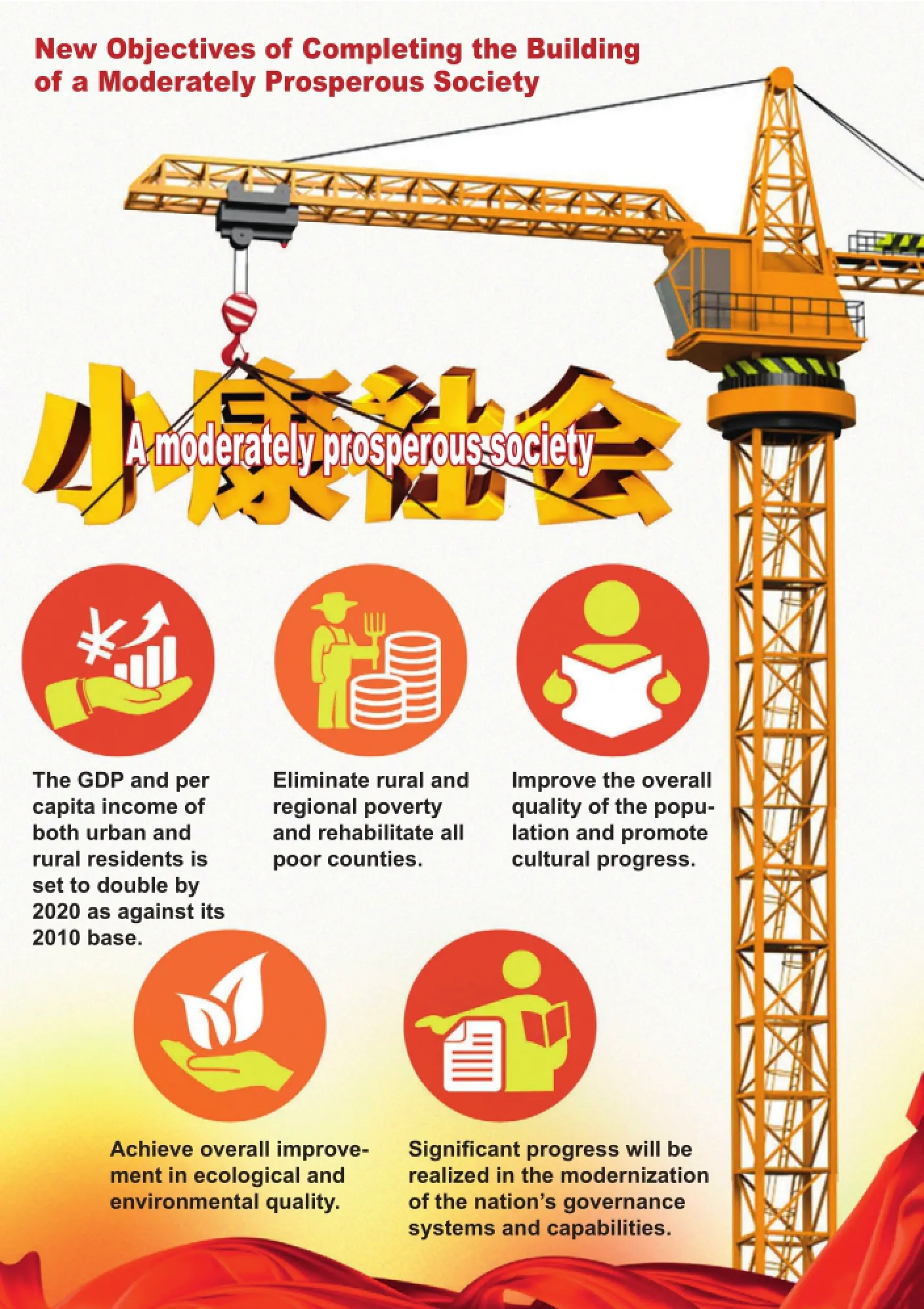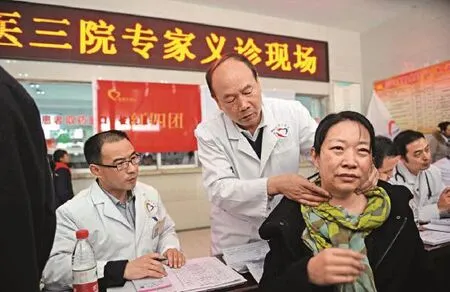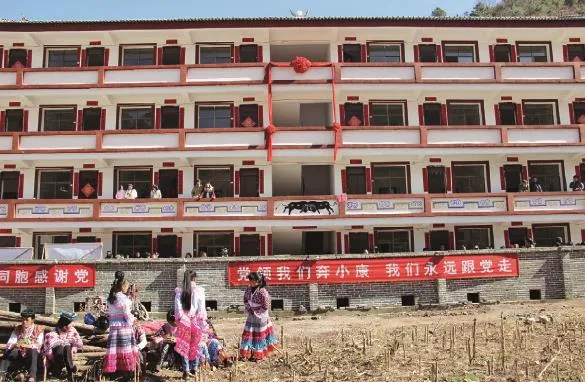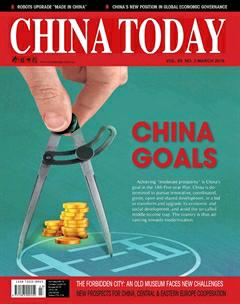Build a Moderately Prosperous Society in All Respects
2016-09-14本刊编辑部
Build a Moderately Prosperous Society in All Respects
By staff reporter LUO YUANJUN
CHINA’S most important goal in the 2016-2020 period is to build the country into a society of moderate prosperity in all respects.
What would a nation of moderate prosperity look like? First, no one would be left below the poverty line. China will strive to eradicate absolute poverty even in the most remote areas. Second, people’s livelihoods will receive better guarantees. Social welfare is expected to cover wider groups of people in need. Education, health care, living conditions and the income distribution system shall be improved to benefit more people. Third, social fairness and justice will be promoted in order to guarantee people’s fundamental interests. The progress of a society is embodied in its fairness and justice. Fourth, more measures to reduce carbon emissions and tackle pollution are achieving rapid progress and will produce ever bluer skies, greener earth and cleaner water.
To bring moderate prosperity to China, as Chinese President Xi Jinping has noted, is to bring about the happiness of the people.

China’s Definition of “Moderate Prosperity”
The concept of moderate prosperity has long existed in China. Ancient people referenced it with a peaceful and happy life wherein people work and then rest at their ease. When China initiated the reform and opening-up policy in the late 1970s, Chinese leader Deng Xiaoping adopted this term to convey the country’s socialist modernization objectives.In general, Deng’s idea is explained as a state less affluent than wealthy, but better off than mere freedom from want. It represents a transitional period from having adequate clothing and food to modernization.

People’s livelihoods will receive better guarantees in a nation of moderate prosperity.
In the 21st century, implementing a well-rounded way of making China a country of moderate prosperity has become a national goal which requires greater advances in the economy, fuller democracy, progress in science and education, prosperity in culture, and a harmonious society in which people live a more affluent life. This is a more comprehensive term which also imposes higher demands on the building of a moderately prosperous society.
Over the past decades, China has scored remarkable achievements in deepening its reform and opening-up, enhancing economic development, and improving people’s living standards. In 2012, a giant leap was made by upgrading the goal of “building China into a moderately prosperous society,” to “completing the building of a moderately prosperous society in all respects.”
New Objectives of Completing the Building of a Moderately Prosperous Society
1Maintaining a medium-high economic growth. By ensuring more balanced, inclusive, and sustainable development, the GDP and per capita income of both urban and rural residents is set to double by 2020 as against its 2010 base, even as greater sophistication in the industrial sector advances and the contribution of consumption to economic growth rises significantly. The urbanization ratio, calculated based on the number of registered residents, will also rise at a faster pace.
2Significantly improving agricultural modernization and people’s living standards and quality. Eliminate rural and regional poverty and rehabilitate all poor counties.
3Improving the overall quality of the population and promote cultural progress.
经改进的流量计,在山东新和成药业有限公司、营口三征精细化工有限公司等单位批量使用,效果较好,未发生过冷凝液聚积引起的失准。该型流量计符合ISO 5167.2—2003及GB/T 2624—2006,节流件经几何检验法检验合格,无需实流标定,在10∶1量程比范围内,系统不确定度能达到1.0%。(上海同欣自动化仪表有限公司)
4Achieving overall improvement in ecological and environmental quality.
5Developing a more mature and well-defined system in every field. Significant progress will be realized in the modernization of the nation’s governance systems and capabilities.
Source: The Communist Party of China's Proposals for Formulating the 13th Five-year Plan (2016-2020) on National Economic and Social Development (ratified October 29, 2015).
Many Difficulties to be Overcome
Looking ahead to 2020’s society of moderate prosperity, numerous difficulties beset the road ahead. One high priority is to cope with the current economic slowdown and maintain a medium-high level of growth to double the 2010 GDP and per capita income of both urban and rural residents by 2020. This will lay an economic foundation upon which to realize the goal of building a moderately prosperous society in all respects. Against the backdrop of the “new normal,” China is confronting slower growth rates. However, it pledges to raise the quality and efficiency of economic growth, rather than continuing an extensive development mode. New growth points like the Internet Plus are being nurtured. In the coming five years, it will be possible to maintain growth of above 6.5 percent.

Doctors from Beijing give a free clinic in Daning County of Shanxi Province. Volunteer activities of this kind greatIy benefit ruraI residents.
Nevertheless, it is a tough act to balance the relationship between economic development and environmental protection, especially when a resourceconserving and environment-friendly society has yet to take shape in China. The interests of maintaining a certain economic growth rate dictate that various industrial projects deleterious to resources and the environment may not yet be canceled. When Beijing hosted the Asia-Pacific Economic Cooperation (APEC) summit in November 2014, polluting plants in surrounding areas were suspended and the city enjoyed clean air and clear skies. In response, President Xi Jinping remarked: “Some call the clear Beijing sky these days ‘the APEC blue’ and say it is beautiful, but ephemeral, and that it will soon be gone. I hope and believe that, with persistent efforts, the APEC blue will be here to stay.”
Comprehensive poverty alleviation is the hallmark of the consummate achievement of a moderately prosperous society. President Xi often stresses that rural living conditions are a key criterion for testing whether the nation has fulfilled this goal. Only by lifting the remaining 70.17 million indigents in rural areas out of poverty can the nation’s objective be accomplished. The Chinese government has taken targeted measures to help lift these 70.17 million needy above the poverty line by 2020.
One of the major tasks of completing the construction of a society of moderate prosperity is to narrow the urban-rural gap and realize coordinated development. In addition to reducing the gaps in GDP and economic growth rates, the imbalanced development of personal income, infrastructure, basic public services and living conditions needs to be redressed.
No one would be left behind on theway to a society of moderate prosperity. Zhang Bin, an owner of an advertising company in Xi’an, Shaanxi Province, observed: “Large gulfs gape not only between cities and the countryside and between different areas, but also between rich and the poor all over the country.”In his view, this is the biggest challenge to achieving the goal. “The government must take effective actions to tackle the tendency whereby wealth flows into the hands of the very few. It will otherwise be hard to accomplish this goal in the next five years.”
Development Philosophies Must Change
Under a background of winding down extensive development, China’s transformation of its development mode and enhancement of its innovation capacity has become an inevitable measure towards preserving medium-high economic growth. More equitable and sustainable progress with higher quality and efficiency will not likely be achieved unless the country grasps the opportunities presented by the new round of scientific and technological revolution and industrial renovation, and adheres to the notion of mass entrepreneurship and innovation, as well as beefing up several of its global premier industrial clusters such as China’s high-speed rail.
Yet, in a country with an enormous population, entrepreneurship in itself is not sufficiently capable of benefiting the majority of the people. Instead, ensuring employment is the prerequisite to realizing moderate prosperity. Promoting employment is instrumental to reducing income disparities and guaranteeing attainment of a prosperous nation. Li Hua, who runs an online clothing store, said:“Booming e-commerce is often blamed for impacting employment in offline shops.” However, Li thinks differently:“Online stores and courier services need staff in the first place. More importantly, e-commerce releases some service jobs without much technical content. I believe solving employment problems requires meeting the needs of the time, rather than simply representing a matter of job opportunities.”
According to China’s Ministry of Human Resources and Social Security, the registered unemployment rate in Chinese cities stood at 4.05 percent in 2015. Xia Jiechang, a research fellow at the Institute of Finance and Trade Economics of the Chinese Academy of Social Sciences, said: “Employment promotion should be a main priority of macroeconomic regulation and control objectives and the tasks of governments at different levels. When the government enacts policies involving industries and investment, attracts foreign investment, adjusts economic structure, and develops new economic organizations, it should give full consideration to the development and utilization of labor resources, while treating employment promotion as one of the preferential economic indexes.”

A dwelling project to improve locals’ housing conditions is completed in January 2016 in Lunhe Village, Guizhou Province.
The nation is endeavoring, moreover, to boost ecological progress and integrate the philosophies, principles and targets relative thereto with all aspects of economic and social development, and further implement these in plans and projects at different levels. China has resolved to implement vertical management of environmental monitoring and internal inspection functions at subprovincial levels. The general belief is that this will enhance the uniformity, authority, and effective enforcement of environmental protection laws and regulations.
In China’s 13th Five-year Plan (2016-2020), to develop a more mature and well-defined system in every field has emerged as a new objective for realizing the country’s goal. In one sense, to turn China into a moderately prosperous society equates with uplifting the country to the level of a society with more mature and established systems, all bearing the stamp of socialism with Chinese characteristics.
In sum, fulfilling the goal of completing the building of a moderately prosperous society on schedule requires stable economic development, improved fundamental public services, and assistance to the needy. At the same time, such fields as education, employment, income distribution, social security, and health care must be improved. Just as President Xi remarked, the true meaning of building a moderately prosperous society and realizing the Chinese Dream reposes in the happiness of the Chinese people.C
